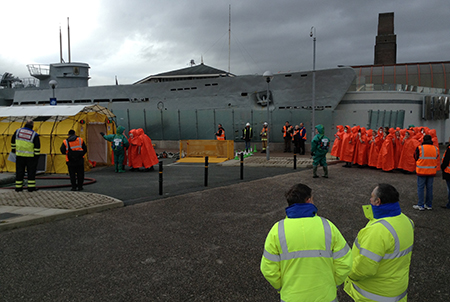University of Liverpool psychologists were on hand to observe a collision between a ferry and a ship on the River Mersey, as part of a drill to test emergency services’ responses.
Code-named ‘Operation KMAF Warrior’, the maritime disaster, led by Merseytravel on behalf of the Merseyside Resilience Forum, was designed to make sure that all relevant organisations from the emergency services to health bodies are co-ordinated and can learn lessons from the exercise to improve their responses in the event of a real crisis.
To achieve this they were observed by a team of University psychologists, led by Professor Laurence Alison, who specialises in critical incident decision making and performance. During the event Professor Alison and his team, together with colleagues from the University’s School of Electronics, Electrical Engineering and Computer Science, observed commanders and staff on the ground, taking notes about how they assessed each stage of the crisis.
He said: “We are keen to learn what cues experts pick up on, how they perceive threats, how they triage activities and how they communicate these emerging pictures to others.”
Professor Alison’s team were also observing the reactions of the public to the crisis, in this case played by University students who were first part of the crash and then subjected to mass decontamination procedures led by Merseyside Fire & Rescue, as part of their specialist unit.
The Liverpool team from the Centre for Critical and Major Incident Psychology are experienced in carrying out these types of assessments and regularly take part in local as well as national crisis response programmes with agencies from across the emergency services and their relevant partners.
Professor Alison concluded: “In a real life emergency time is very short and priorities have to be decided very quickly, so the more preparation we can do with key agencies, the better.
“Professional psychologists have a key role to play in improving these processes and, should the worst happen, hopefully are able to assist emergency responders in their live saving roles.”
